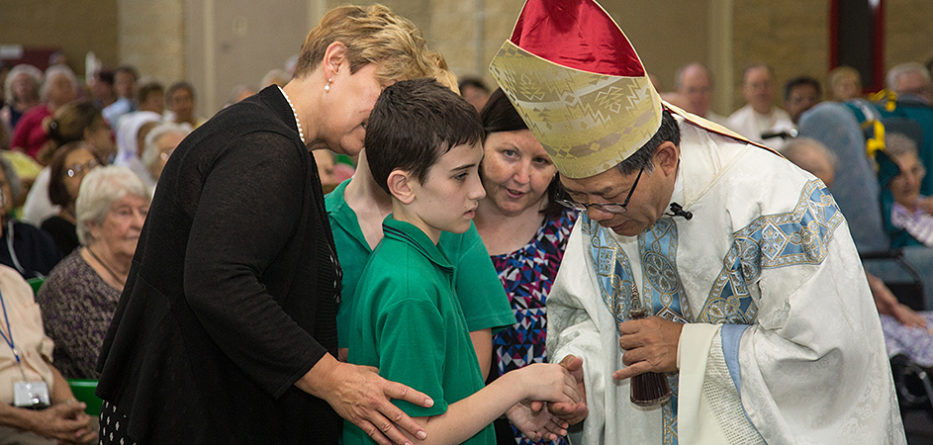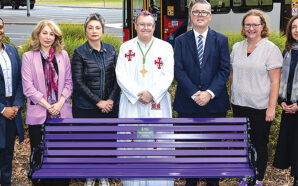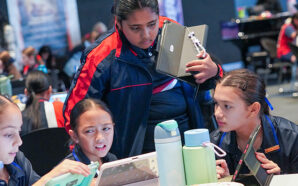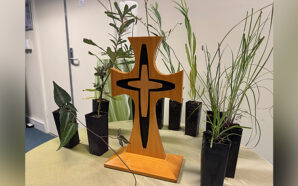Parents with children who have a disability can feel as if they are distractions at Mass and in parish life rather than full members. What can we do about that?
Jesus Christ said “let the children come to me”, and parishes should be well-placed to welcome all young families, but we can always do more to reduce the barriers some face when they have a child who experiences physical or cognitive challenges, says disability theologian Dr Zachariah Duke.
In 2017 Dr Duke travelled to Rome as the Australian coordinator of an international convention for several hundred participants, honouring persons with disabilities and highlighting their unique contributions to the Catholic community. In a private audience during that event, Pope Francis told the group that the church was “a church for everybody or it’s not a church at all”, the theologian said.
In the lead-up to International Day of Inclusion of Persons with Disability on 3 December, Dr Duke told The Catholic Weekly that many parishes acknowledge and celebrate those with disabilities for the day, but miss opportunities to foster a welcoming environment for everyone throughout the year.
In his 2015 PhD thesis he argued that while the Catholic Church in Australia accepts, welcomes and advocates for all people regardless of their intellectual or physical abilities, people living with a disability remained a largely marginalised group within the church at the day-to-day level.
Asked what would help most, Dr Duke said that while things like wheelchair accessibility, large font sizes and hearing loops are necessary, it’s also important to address more intangible barriers to disability access to the sacraments.
That means fostering a culture of authentic belonging, building individual friendships so that people are understood and feel missed when they’re not present.
He also recommended leaders survey parishioners to find out what their needs are.
The prevalence of disability generally increases with age, but according to the Australian Institute of Health and Welfare, children and young people with a disability are most likely to have a severe or profound disability than older people.
That includes categories of sensory (sight, hearing) and speech, intellectual, physical and psychosocial disability.
According to the 2022 data, of all people with disability, those aged 25–64 are the least likely to have severe or profound disability at 23 per cent, while those aged under 25 are the most likely at 49 per cent.
It reveals that 7.6 per cent of children aged 0–14 have disability and 9.3 per cent of people aged 15–24 have disability, with an even split between males and females after age 15.
Considering the prevalence of disability among young families and the consequent opportunities for parish outreach and evangelisation, Dr Duke said that apart from the common physical accommodations, so-called ‘sensory-friendly’ sacred spaces or Masses, with lower lights, quieter music and other helps for people with intellectual and developmental disabilities, might be useful but that he had a “foot in both camps”.
“I know some families appreciate that opportunity because they know it’s a safe place for them to go and to be looked after,” he said.
“But it also does in turn then create again a sense of marginalisation, because if we’re really about what St Paul talks about in terms of [each belonging to] the Body of Christ, then if we just get on with how we normally do things for 51 weeks of the year but for one week we invite people to a special Mass, that’s not really what we want to promote.
“What we want is that sense of celebrating every day of the year our community as the Body of Christ where all are welcome, and if someone doesn’t seem the same as you, well people are different,” he said.
“The gem in the stone here is if we can shift our mindsets to creating our local parish communities into pockets of belonging, then we can achieve inroads not only in terms of disability inclusion but in addressing all kinds of marginalisation that may be within a particular community.”
Sarah (not her real name), a Sydney Catholic whose teenager has autism, agreed that people with a disability should be accepted as the unique individuals they are and not segregated out of sacramental life.
She said her son’s disability does not prevent him from engaging happily in parish life, and in fact is part of what makes his family, school and wider community a better place to live and worship.
However, she said in the early years of parenting she felt self-conscious taking her family to Mass and says Catholics can play their part in fostering a culture of joyful acceptance of all children.
She said she has got used to answering questions about some of her son’s behaviours and makes “generous assumptions” about people’s motives when they say things that she may have previously found hurtful.
“I can understand why some people give up on taking their children to Mass and just watch it on TV,” she said.
“But I really believe that we need to normalise disability as part of human life and the best place to start is in our churches.
“We need to be an example to schools, governments and society in general, because in the Church we do things differently, we’re taught to value all life. We need to be a Church full of life, hope and acceptance, showing how we love everyone and we don’t put conditions on including people.
“We just want compassion and to be treated like everyone else. God is present in all children, and God loves children. He tells us to be like them, that the kingdom of heaven belongs to them. Our son reveals God to us all the time!
“Every child is born with a gift and for a child with a disability they also have a gift, and it’s up to us as parents and parishioners, teachers and relatives to notice it and love them because it’s not easy for them to exist in a world where they’re constantly scrutinised and questioned.”
Mother of two young boys Carla Shaw said she has struggled with taking her eldest son Moses, who also has autism, to Mass in a regional parish because he often needs to move around and at age six is too old to be content to remain strapped in a stroller for the duration.
While the parish priest was supportive of the young family’s attendance at Mass, her family has sometimes felt unwelcome at their home parish due to the negative reactions of some parishioners.
She also believes the Plenary Council of Australia did not sufficiently reflect the voices of Catholics who experience disability; what they need from the Church and what they can bring to it.
“We want to do outreach to the poor, teenagers, young adults, those in foreign countries, but it can be easy to forget the poor who are sitting in the pews, the person whose marriage has just broken down or the parents of a child with a disability. These are the spiritually poor,” Mrs Shaw said.
“People tell young parents this will all get easier as the kids get older, but this really changes your life, the way Moses experiences the world is hugely fundamental to everything that we do.”
A recent house move brought the Shaws some new hope. “I met two mums who invited me to Eucharistic adoration with their kids, one with a one-year-old and four-year-old said her kids will be making some noise anyway, and they could ask the priest to close the doors so Moses can’t run out of the church. It was just so nice, and I couldn’t believe it.”
Marilyn Rodrigues is a journalist for The Catholic Weekly (print and online). She has worked as a journalist and columnist for the paper intermittently since 2000 and sees the CW team and readers as part of her extended family. Her special interests are spirituality, psychology and mental health, and life issues. Marilyn blogs in her five minutes of free time a week about faith, family, work and life at marilynrodrigues.com.
Reproduced with permission from The Catholic Weekly, the news publication of the Catholic Archdiocese of Sydney.








